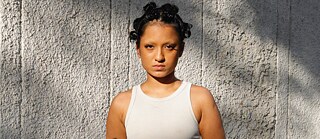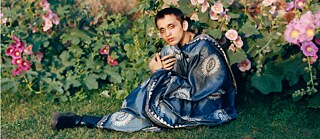Kavya Trehan “The last feeling I ever want to feel is being bored”
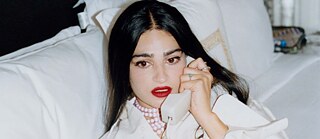
Kavya Trehan is a singer-songwriter, recording and performing artist from New Delhi, India, who has been performing since the age of 14. In the interview she speaks about her projects, her relationship with art, and her roots.
Compared to the constant hustle and bustle of Jaipur, the lobby of the five-star hotel where Kavya – singer, performer, actress and model - has been staying since last two months seems almost bizarrely calm and relaxed. The water from the fountain splashes gently on the white marble. The voices of the guests and the perfectly polite and courteous staff are lost in the vast hall, which, with its velvety sofas and finely carved staircases, looks like the interior of a royal palace in Jaipur. Kavya is also currently working in the Hawa Mahal, the Palace of Winds, on a film project for which she is in Jaipur and which we are not allowed to write about yet - but which sounds pretty “big” and mainstream. And anyway, if you look at Kavya’s artistic career - she started acting in theatre at eight, her first band at fourteen, her first film at seventeen and then modelling and dancing on the side - you would think she was already pretty big in India. But in fact, her atmospheric singer-songwriter music and the elaborate costumes she wears during her live performances, which interpret traditional elements in a modern way, don’t really fit into the broad mainstream, which is still more oriented towards Bollywood and the like; here she is an aspiring independent artist. But until shortly beforehand, it didn’t seem likely that she would find time for us at all: Kavya’s diary is full, of an hour and a half or two hours she can of course spare for us, but we are travelling five hours from Delhi to Jaipur - and now we are sitting in the mentioned chic hotel wondering what awaits us: a fast-paced shoot with a short interview? Instead, a bubbly, warm and incredibly charming woman comes down the stairs and hugs us. For the next five hours with her, we’re almost constantly on the move, taking a tour of the hotel, shooting on the roof terrace, then in her co-star’s room, then in her room, followed by lunch with another co-star, a trip to the royal palace and hanging out in the make-up truck; Kavya’s mobile phone is ringing all the time and at the same time she’s providing us with everything we could possibly need: helpful contacts, iced coffee, cough drops, food, a private tour of Jaipur’s most visited attraction and her driver and car for shopping and the ride back to the station.She also manages to talk to us at length. For reasons of space and intimacy, we leave out long passages about current partners, German sausages, Indian films, the Jaipur royal family (be sure to Google them, the king’s mother ran off with her driver’s son, the king of Jaipur, called “Pacho”, is a very successful polo player and a much sought-after bachelor, and they all like to party, from what I've heard). We also skip passages about fascism in India and Germany, about hanging out with Ishaan Khatter and Vihaan Samat, fellow actors, and various phone calls, because this is supposed to be about Kavya, a multi-talented artist and simply an incredibly nice person, who begins to interview us first.K: Kavya Trehan
KH: Katharina Holzmann
A: Amelie Kahn-Ackermann
KH: Wow, we are in a different world.
K: It’s fabricated. I see so many individuals coming in, they’re like, oh, India is so beautiful. I’m like: this? This is not India. Would you like to have some coffee? My co-actor is literally in his room right now preparing coffee. He is a really big actor. His name is Ishaan Khatter. Do you know him? If you’d like me to ask, he can make extra for us. We can have a coffee together.
"Hi!
Do you want to make two more?
Huh? Yeah? Are you sure?
No, I was going to come to you. You’re beautiful. Okay, I’m coming with my friends. No, no, you’re fine, you’re fine. You sure you can do, like, total will be three iced?
Aww, thank you.
Okay, bye."
Should I show you around? Your relationship with the hotel changes when you’re living here for two months. I know every corner. Let’s go and then we will have coffee. And I wanted to offer you, we are going to go to City Palace after this. It’s a beautiful place. You are most welcome to join me. How was your train ride?
KH: It was fine, we took the Express train—and we love to be able to see something outside of Delhi. You grew up in Delhi, right?
K: Yes, I’m from Delhi. Where in Delhi are you guys staying?
KH: At Hauz Khas-Village, kind of a little party area…
K: That is so close to me! If you guys ever need anything, let me know. Because my mom is right there. So in India we have a rule by the way, which says that our guest is our God. So it’s a cultural thing, whenever someone is coming, we need to make sure that you are taken care of. It’s almost like our selfworth is compared to how your experience is. And tell me, how did you start, what does your magazine cover?
KH: Yeah, everybody is so nice and welcoming. You really get ashamed about us Germans–were not so good at hospitality. “Das Wetter” started not only as a music magazine, we started as a music-literature magazine, but now we are covering theatre and arts in general, whatever catches our interest …
K: I love that! That’s so cool! I’ll tell you why: I’ve always been a slightly confused person when it comes to how people perceive me. I’m not confused myself. I call myself thirsty, because I feel like my project or whatever I want to pursue is a little bit of an amalgamation of theatre, fashion and dance. I saw my mom dancing all my life, and she’s been such a role model for me. It’s just been what she wanted to do and have us surrounded with, I guess, movement and body positivity because it’s just the three of us, my mom, my sister and I.. And so to know that there is a publication that exists where you’re not going to box someone as a “musician” or something else … What is your full name?
I call myself thirsty.
K: My full name is Kavya Trehan. You know what it means? In Hindi, because all of Indian names have an associated meaning, it means: a poetess. That’s why I keep telling you so much about our culture, because even our names, and one of my songs is about that, is about the trait that the parents want their child to grow into. I was like, well, prototype. I did it.
KH: So you got the name and then you were like, okay, this is what I’m going to do? Did you first start off with acting or with singing or…?
K: I was an actor at eight. A theatre actor. And then I shifted to going to school. That was really amazing. And then I started making music when I was around 14 years old and I started acting for films when I was 17. So everything kind of happened simultaneously, so fast...
KH: You played in a band before you started performing solo?
K: I did, I did. It was a UK-like garage band. It was very angry and aggressive. I needed to get it out.
KH: Puberty!
K: Yeah, that puberty lasted for a while. I think the reason I wanted to do that was because I didn’t actually ever have role models as, I hate saying this, but as a female artist. We never call male artists male artists, we just call female artists female artists. So I always thought that if you want to pursue music, you’re going to have to form a band, and then you’re going to have to do this and that and I got everything on the go. So, the intention behind the band was A: to learn from the people around me, B: just have a lot of fun and feel secure that you’re not doing this alone. I just thought that it would be a safer environment. And I was very happy to have some good human beings around me. But I wish there would have been more women in the band. But that’s just how the cookie crumbles. This is why now I’m very actively seeking for a manager who’s a woman, an agent who is a woman and so on. Because I’m tired of exhausting myself over explaining things and I just realised that we now achieve so much in a year than what could have been done explaining this is why I don’t want to do it. Things like: “Oh but her music is so avant-garde.” “We don’t know where she fits in.” With a male artist with a similar sound it would just be like: “Yeah, that is cool.” I know some female artists who wanted to pursue music, but the hiccup was, their family wasn’t supportive. And that was one obstacle I never had. I had a very supportive family.
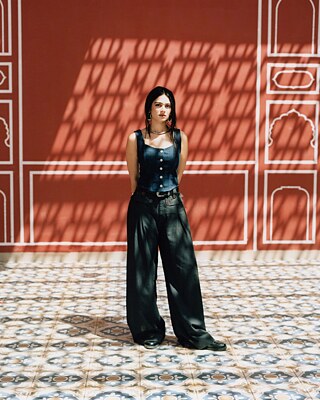
Kavya Trehan | Photo: Amelie Kahn-Ackermann
K: Yeah, and my sister is the creative director for all of my art. Her husband is also part of it. So actually… It’s a family special. I’m running a mini family production where nobody gets paid. Everybody has to make sure they support me.
KH: We actually found you through a friend of Amelie who we met at Munich Airport while travelling to Delhi. She had lived in Delhi and recommended a producer to us, Sandunes … We wanted to meet her as well, but she’s in LA right now …
K: I have a song with her right now. Production with her is off the hook. It’s amazing. She’s my favorite artist and she was like my dream artist to work with. At age 14 when I started music, I would relentlessly go to music festivals and I would always see these artists. You know that game where you listen to a song and you’re like: Oh, this reminds me of this? When I saw her, I was like, I don’t know. I don’t get that. Who is that? Where does that come from? And what are these feelings? I felt like time was standing still and this stunning, gorgeous powerhouse was creating beauty and it was all instrumental. I’m a vocalist, so when it’s instrumental I’m the first to start yawning. Yeah, it’s weird. Maybe I feel it first, then I process the thinking of it. I don’t know what it is. Feelings before thinking. Heart before mind. Not to say that words don’t make you feel things but it’s still more of a mind to heart. And then I kept seeing her whenever she would perform. I would be that person standing in front and I’d be like: this is incredible. And then, in 2016 I got introduced to her by a fellow musician.
KH: You just made the one song with her, right?
K: No. I’ve made two songs with her. I’ve done an entire tour with her. So I perform first and she performs after. And then she’s on my album. We’re writing three more songs together. I’ll tell you why you should chat with her. It’s because she’s probably the first person who broke it down to the benign conversation you need to have, which is: What does it take to be a musician? And she turned it into a curriculum. And online, I would attend it. I had no underschooling of know-how of who’s a booking agent, what’s a manager, okay, if I’m getting paid this much, should that percentage be like ... She broke the boring stuff down, which is how you survive in the music business. And it’s changed the game for artists. She’s an Ableton certified trainer. So you can actually go to her and say, this is my song, I don’t know what to do. And she’ll do an hour-long impromptu conversation telling you that you can do this. She’s opening up music in your heart. She’s the anti-gate keeper.
KH: That’s so cool. India is such a big country and still it feels that you have such a small but strong artist community. You all seem to have this thinking of teaching everyone else what you know. We had a talk with Shreya, she’s a tattoo artist also from Delhi. And she kind of said the same: that she learned it when she was back in the US studying and then she came back and since then she’s been doing all kinds of workshops just to teach everyone.
K: Wait, is this Shreya who has like a very white upper lip? Oh my god! She’s married to a friend of mine!
KH: See, again: everybody knows everybody! How are you all working together? Is it like a process of coming together, talking together or making music together?
K: I just reach out and it happens – but actually I’ve realised now that I do a lot of research and that means the whole breakdown of: When did this artist start, what did they start and why did they do it? I also research if their ideologies and their journeys align with where I want to go. That’s when I realise that there is this desperate desire to work with them, because they can answer all the questions that have been unanswered for a very long time. And because I am an extrovert I need to feed as a human being before a musician, as a human being before as an actor and an artist and I realised that this is the only way I’m going to be able to make my music. Not in isolation, not in limbo, but with people. It’s something I was made aware of when I was very young, where I always wanted to have study groups, I always wanted to do colouring books so that I do half of the colouring and then I pass it onto the next person and then they cover the rest of it, because I want to see what they see differently. And be expressive. Yeah, and a shift of perspective is why I like to collaborate. I mean, if I’m smart, I want to play the game. But I just want to feed my art. Now it’s become more about researching. Trying my best to contact them. And then, just building a rapport. And in the build of rapport, there have been so many artists that I‘ve just not even reached the musical stage with. Because as people, we don’t think eye to eye, or we don’t have that one film that we connect on. There needs to be something under the surface that we’ve lived and experienced that a song can finally be about. It can’t just be about love, money, bitches, dicks, whatever. It has to be about something that is so common: the experience of a collaboration is more important to me than the final product.
The unknown doesn’t scare me.
K: The intention of creating something should just be left to that versus how it needs to be perceived. The joy and the versatility of how differently things can be interpreted is art for me. If you have an intention of something being received in a specific way, it’s going to bomb. So I think the therapy and music relationship for me is that music has helped me process a lot of things; conversations or scoldings or therapists haven’t helped me understand. Of course all of us go through our ebbs and flows in life and sometimes you just need something to click. It could be anything for anyone. I’m just fortunate that it’s music for me. It’s how I express myself, want to express myself and almost need to express myself. So I don’t really ever know how it will be received and I don’t want that control. I control enough in the process of making the music and the rest is supposed to be just obligatory to me. And once a song is written and released, it’s not mine anymore. I’ve done my processing, I’ve said what I needed to say and now if somebody says it’s shit, then yeah, maybe it is shit in your eyes. And I’ll take it. I’ll take it with a upper lip, but I’ve been fortunate enough to have some individuals come up to me and tell me that they’re really reciprocated or they were going through a difficult time and they listened to the song and that’s what it felt like and sometimes it’s a line, sometimes it’s so different that I’m like, oh god, now I listen to this song and it does feels like what you said more than what I was thinking. The unknown doesn’t scare me. I think that’s why I do it because if I knew how it would land, it would be so predictable. And then I would get bored. The last feeling I ever want to feel is being bored. It’s such a bad feeling.
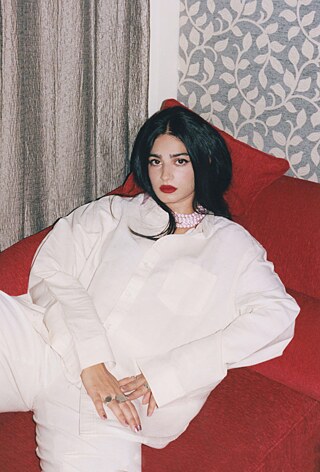
Kavya Trehan | Photo: Amelie Kahn-Ackermann
KH: It doesn’t seem that you could get bored very soon – besides the music, do you have kind of the same approach to everything, or does it differ for acting or dancing, is one or the other more technical or whatever?
K: Oh no, it’s different. I think my approach to music is instinctive. And less practised. I actually like the raw versions of my music a lot more than the cleaner versions, which is why for mixing and mastering I give it to someone else so that people don’t have to listen to my muddy music. With acting I actually keep revisiting the script and I write a diary as the character that I am. So it’s a lot more disciplined than my music. When it comes to dance, I think dance and painting is a lot like my music. So, only acting and music are different for me. But the strength that I know that I have is the performing of my music because that’s when all the worlds collide, and they make this beautiful cacophony of systematic chaos where I’m feeling and expressing everything second by second. And then it makes sense. It’s the free flow of making improvisations in music. And it’s the body which is doing that. I think the best performances I’ve ever had are those when I feel emotionally, mentally, spiritually, physically exhausted. Because then I’ve genuinely been present in that moment. So live music is kind of the point of it all. It’s like completely synced. But it takes a lot of practice, I rehearse a lot and I also have visuals, so sometimes in one of the songs when my hand goes up, there’s a visual that needs to go up as well, so I practice all of it, but when the timer is on and I’m on stage, I get everything, and it’s time to be the musician and not the actor. So yeah.
KH: Tell me about your performances – you wear these beautiful costumes and you also do something with your hair, right?
K: It’s been like a slightly cerebral process for me to bring the Indian out. Because by default, when you think of India, you would think of this beautiful, glowy, dusky skin, or you would think of almond eyes. I don’t have those features, I’m pale as a ghost and I just have big eyebrows and hair so I was like, how do I share that I’m from India and represent the version of India that I am, truly in an authentic space? And I realized that it’s my hair. And my mom and I always wanted to do an Indian cultural dance called Kathak. It’s a form of dance that most of my classmates would go to after school. But we had a difficult upbringing so those liberties financially were something that we couldn’t afford at that point. So I’ve incorporated my childish desire in the costumes that I wear when I’m performing. It’s almost like a creature of my memories. So there’s this element called Parandi, which is this fake long hair that you wear when you’re performing Kathak and different Indian dances. It’s very heavy, it’s about two meters long. And so I’ve incorporated that. It’s something that I couldn’t have, but I can have now as a performer. What I never want to do is to tokenize my Indian side, which is to wear a Saree or something because that’s not what I’m like in normal life. So instead I’m wearing Indian designers’ clothes. And they’re my friends thanks to my mum and thanks to the fact that I’ve been modelling since a young age. Knowing that I can wear those on stage with designers that also have a very strong musical side in their roster makes me feel really good. It’s a nice exchange. It’s like they created their clothes thinking about music, I create thinking about the fashion. It’s always a conscious effort to wear the designers that I resonate with. Also, when those designers have their fashion week, I create the songs and the tracks for them. It’s a nice collaboration and there’s a lot of effort because it has to be the right colour–it needs to match the background and the lighting. I’m trying to feel strong when I’m on stage. I’m trying to feel bigger than my body, when I’m on stage and I need help. I can’t just be myself alone on stage and it’ll be okay. I feel like costumes often give me the security to hold on. I feel so strong and I feel responsible for carrying somebody else’s creation as well.
KH: You mentioned you couldn’t afford the dancing classes–how important is your social background when you try to be an artist? That’s a topic that came up in a lot of conversations that we had in Delhi: Do you have to be in a higher caste or from a wealthy family to be able to be creative and to make it a career?
K: I come from a low middle class background, single parent, only mom, two kids, so that’s double the expense and a very old school mindset of my late father’s family. They still don’t understand what I do. So the support is actually a one degree support and beyond that it doesn’t exist. I also don’t give a fuck, so it’s fine. But there was a point before digital music making or bedroom music making existed, that only well-do, richer family, trust fund kids would be musicians because they could afford the studio equipment, switching the AC on the entire time and so on… Your bills are massive. But that’s changed now. I personally think it’s changed because you do have more access when it comes to technology. You just need a laptop. You have the tools, you just need to build the skills. I feel like it’s just not as accelerated a process for someone from a lower class. But then we also need to be a lot more vocal and ask for help. And help each other. Maybe our music isn’t going to be as pristine and incredible, but then there’s so many more creative ways to make it your own. So you can be creative, you’re just going to be successful slightly slower. I’m so happy that I actually have a lower middle-class background because it makes me think of things in a more creative way and I’m fine being a slow burner. I didn’t buy my first synthesizer till I was 27 years old. Before I just asked for it, I was like, hey, you have a synthesiser, you’re not using it, can I use it? And good people would help me out.
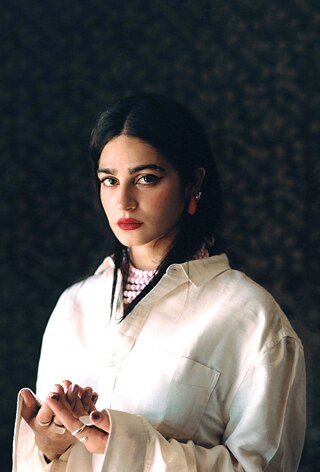
Kavya Trehan | Photo: Amelie Kahn-Ackermann
KH: So, again, it’s all about community?
K: We just have to mentally be okay with the fact that it’s not going to be an overnight success story for us. But do we really want an overnight success story? That’s why I started modelling. I was like, I need to figure out how to make the money to afford being a musician. It’s a very expensive passion. You have your instruments, you have an electricity bill, you have jam rooms where you need to practice, you need to pay fellow musicians so that you’re not being the person who’s asking for favours. Set the standard. I did so much work for free. It’s crazy. People at power love unaware artists. They just die for it. That’s why I always pay something, even if it’s just a token amount. Even if it’s 5 euros, I don’t care. It’s just the ethic. And in the long run, that really helped. The same people will come back and work for you. And it’s my duty to let them know that you should be asking for your money, for your time’s worth. Your work is worth something. And taking advantage of it isn’t the world I want to live in. Even if it’s a tiny fucking world of good people, I just want to die knowing that I did whatever I did. And no, no, I’m sure I took advice from someone and I should have paid someone more. In my current existence, I’m trying to do my best and tomorrow when somebody else is going to be like, hey that song that you did with the producer was really good, I’m not going to gatekeep them, I’m going to give your email and be like, here work with them.
KH: Do you feel kind of rebellious in the sense that you’re trying to do things in a different way than what’s common in the music industry?
K: I don’t think I’m consciously trying to rebel. I think I’m coming from a very respectful space. At least that’s the intent. I rebel in being very outspoken about certain things. I rebel in standing my ground when it comes to how I want to be treated. I mean it’s called rebel because a woman’s doing it, I suppose. But I also rebel in the fact that I mix everything. I rebel in the fact that it’s so much easier to be consumed in one specific stream. And I don’t care for that. I rebel in wanting to do what I want to do when I want to do it. I want to be really hard to work with. I do not want to be submissive. I will adapt respectfully when required. But at the end of the day, we’re all trying to do a job. We’re all trying our best to do it for a way bigger reason and we’re a small peg. If we start to constantly bend over backwards, we’ll never break the system. To be a part of the system and to do it as honestly, respectfully, as we can. And then maybe tomorrow we will find people who are receptive and who are listening to what you have to say, and be like: hey, actually she’s perfectly right. You should be doing these things because everyone is so different.
